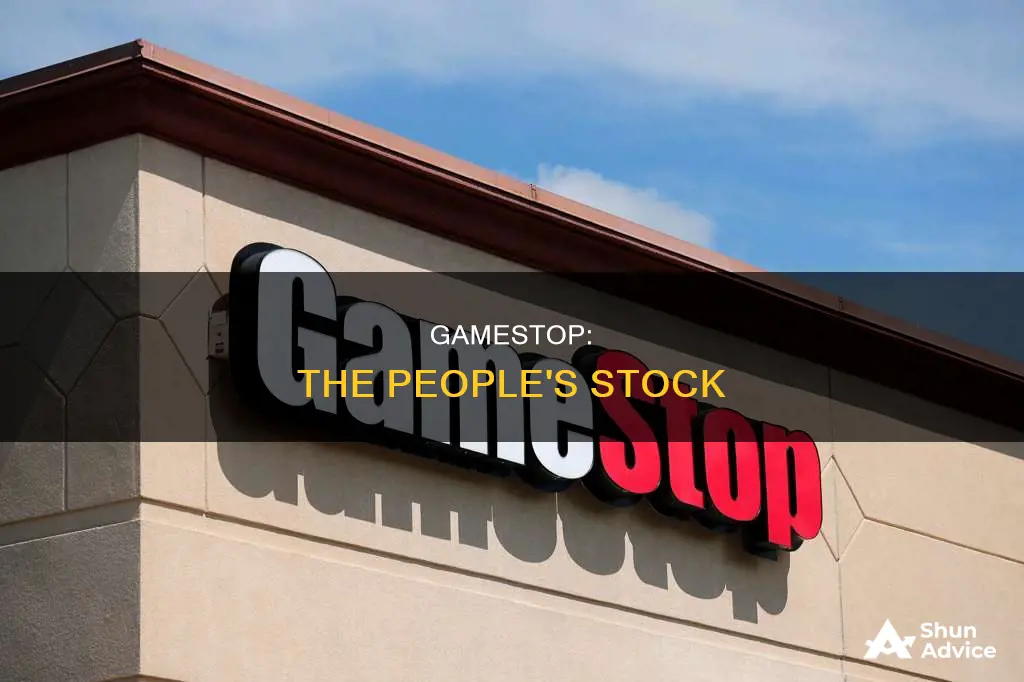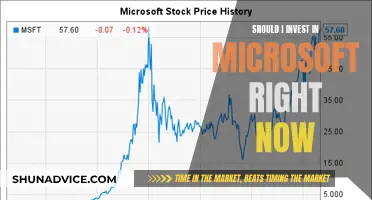
GameStop's stock has seen a massive surge in value, driven by a group of mostly young day traders coordinating on Reddit to drive up the share price of struggling companies. This has created a short squeeze, where short-sellers who betted against the company are now forced to buy shares to cover their losses. The interest in GameStop's stock activity has thrust the Reddit group r/WallStreetBets into the spotlight, as they are seemingly driving the surge. The group has been described as 4chan with a Bloomberg Terminal, and their involvement has turned GameStop into a meme stock. While some investors are wary of the stock being overvalued, others see it as an opportunity to profit from the short squeeze.
| Characteristics | Values |
|---|---|
| Investor type | Hobby investors, day traders, small investors, armchair investors, young people |
| Investor motivation | FOMO, fun, childhood memories, belief in a potential turnaround, underdog status |
| Investor behaviour | Buying a ton of GameStop options, creating a short squeeze |
| Investor outlook | Short-term savvy investing |
| Investor concerns | Losing money, media coverage causing harm to inexperienced investors |
| Investor advice | Only invest what you can afford to lose, pull out original investment and play with house money |
| Investor examples | u/DeepFu*kingValue, u/dumbledoreRothIRA |
| Investor platforms | Reddit, TikTok, Robinhood |
| Investor targets | Hedge funds, Wall Street titans, short-sellers |
| Investor impact | GameStop stock up 2,419% since April, Melvin Capital requires $3 billion in external financing |
What You'll Learn

GameStop's share price rose from $40 to over $500 in a few days
The GameStop stock surge can be attributed to the activities of a group of mostly young, retail investors coordinating their efforts on the Reddit group WallStreetBets. This group of investors deliberately targeted GameStop, along with other struggling companies, to drive up their stock prices. In the case of GameStop, the involvement of Chewy co-founder Ryan Cohen, who brought digital experience to the company, sparked initial interest. Cohen's appointment to the board and his increased stake in the company signalled a potential turnaround for GameStop, which had been struggling to compete with digital retailers.
The buying activity of the retail investors on Reddit created a short squeeze, where hedge funds and other institutional investors who had betted against GameStop by short-selling its stock were forced to buy back shares to cover their losses. This further drove up the share price. Short-selling involves borrowing shares of a company and selling them, expecting the price to drop so that the shares can be bought back at a lower price, and a profit can be made. However, when the share price unexpectedly rises, as was the case with GameStop, short-sellers incur significant losses.
The situation with GameStop's stock was characterised by a battle between retail investors and Wall Street hedge funds, with the former taking advantage of the latter's short-selling positions. This dynamic was acknowledged by Jordan Belfort, the "Wolf of Wall Street," who expressed his admiration for the small investors while also cautioning them about the potential risks. Belfort warned that the hedge funds would eventually identify and close the market inefficiency that the retail investors were exploiting.
The GameStop stock surge also highlighted the impact of social media and no-fee trading apps in democratising investing and upending traditional Wall Street practices. The ease of access to trading platforms and the ability to coordinate in online communities enabled retail investors to collectively influence stock prices in ways that caught Wall Street veterans off guard.
Investing: Control, Returns, and Excitement
You may want to see also

Retail investors coordinated on Reddit to buy GameStop shares
GameStop's stock surge can be attributed to the coordinated efforts of retail investors on the Reddit group WallStreetBets, which has a reputation for targeting short-sellers. In the case of GameStop, traders on WallStreetBets identified the short positions taken by hedge funds and other Wall Street titans and moved to buy GameStop stock early and cheaply, creating a short squeeze. As the demand for GameStop shares increased, short-sellers were forced to buy back the stock at a higher price to cover their losing bets, further driving up the share price. This resulted in major losses for the hedge funds and Wall Street firms that had bet against GameStop.
The cast of characters
The situation with GameStop has been characterised as a battle between retail investors, often young day traders coordinating on Reddit, and hedge funds or short-sellers, who are seen as representatives of the Wall Street elite. The former group is often comprised of Millennials and Gen Zers who harbour resentment towards the latter for their role in creating a house-of-cards financial system that led to the 2008 crisis.
The role of social media
Social media platforms, particularly Reddit, played a pivotal role in the GameStop stock surge. The WallStreetBets subreddit, with its over 2 million followers, served as a rallying point for traders looking to take advantage of the short positions held by hedge funds. The group shared investment tips, memes, and success stories, creating a sense of community and energising its members to take on Wall Street.
The impact of no-fee trading apps
The rise of no-fee trading apps like Robinhood has also contributed to the GameStop stock surge by democratising investing. These apps have given armchair investors, who may be far removed from traditional banks, free access to sophisticated trading instruments like options. This has enabled retail investors to more easily coordinate their efforts and make bets on stock prices, amplifying their impact on the market.
The risks and warnings
While the GameStop stock surge may have been a victory for retail investors, it's important to recognise the risks involved. Jordan Belfort, the former stockbroker known as the "Wolf of Wall Street", warned small investors to be careful and avoid losing money when the situation "unravels". He emphasised that hedge funds are experts at identifying and closing inefficiencies in the market, suggesting that the window of opportunity for retail investors may be short-lived. Belfort advised investors to only invest what they can afford to lose and to pull out their original investment once they make a profit.
Fear of Investing: Why the Hesitation?
You may want to see also

Hedge funds lost millions of dollars
The GameStop frenzy on Wall Street has investors and the internet enraptured. On one side, there are mostly young day traders coordinating on Reddit to drive up the share price of struggling companies, including GameStop. On the other side, there are hedge funds and short-sellers betting that a company's stock will crash.
The GameStop short squeeze began in January 2021 and saw retail investors, especially from the Reddit community r/WallStreetBets, driving up GameStop's stock price, challenging several hedge funds that had bet against the stock by shorting it. This event caused major losses for some hedge funds, including:
- Melvin Capital: Experienced a 49% loss in its investments in early 2021 and required a $3 billion bailout.
- Citron Capital: Suffered 100% losses on its GameStop positions during the stock's bullish rally.
- Light Street Capital: A San Francisco Bay Area-based firm with $3.3 billion in assets under management that deflated by 20% in 2021.
- White Square Capital: A London-based hedge fund that was forced to shut down and return capital to investors due to significant losses.
- Point72 Asset Management: A Stamford, Connecticut-based firm with $19 billion in assets that lost 15% in 2021.
- D1 Capital Partners: With $20 billion in assets, they suffered 20% losses over 2021.
- Maplelane Capital: Lost 33% of its $3.5 billion in assets, despite not focusing on short-selling.
- Candlestick Capital Management: A Greenwich, Connecticut-based firm that saw percentage losses in the teens.
The GameStop short squeeze cost hedge funds $19.75 billion in January 2021 alone, and many of these funds continue to experience fallout. While some have returned to normative returns, others have closed down or are seeking new capital. The event highlighted the growing influence of retail investors coordinating on social media and their ability to take on Wall Street giants.
Investing in Startups: Where to Begin?
You may want to see also

Short-selling is a way to profit from a falling share price
Short-selling is a trading strategy where investors speculate on a stock's decline. Short-sellers borrow shares of a company whose stock price they think will fall and sell them on the open market, hoping to buy them back at a lower price later. This strategy is a way to profit from a falling share price.
Short-selling is a speculative trading strategy that involves considerable risk. When you short-sell, you are betting that a stock's price will decline, and if you are wrong, your losses can be significant. Short-sellers are subject to potentially limitless losses because there is no upper limit to a stock's price. If the stock price rises instead of falling, short-sellers will have to buy back the borrowed shares at a higher price, resulting in a loss.
Short-sellers also face other risks, such as sudden changes in fees, dividend payments, and margin calls. The cost of borrowing a stock can change frequently, and short-sellers are not entitled to dividend payments, which are deducted from their accounts. Additionally, if the value of the collateral in their margin account drops below the minimum requirement, brokers may issue a margin call, requiring them to deposit more cash or securities immediately.
Despite the risks, short-selling can be a profitable strategy for those with a firm conviction that a stock's price will fall. It allows investors to profit from a falling market and can act as a hedge against other long positions in their portfolio. Short-selling also has the potential for high profits with little initial capital required.
In the case of GameStop, short-sellers were betting that the company's stock would continue to struggle due to its brick-and-mortar stores in an age of digital downloads and online gaming. However, the involvement of Chewy co-founder Ryan Cohen, who joined GameStop's board and brought digital experience to the company, caused a surge in the company's stock price as investors believed in a potential turnaround. This surge resulted in significant losses for short-sellers, who had to buy back the shares at a higher price to cover their losing bets.
Investing: A New National Pastime?
You may want to see also

The GameStop story raises ethical and legal questions
The situation also raises questions about the ethics of individual investors coordinating to drive up stock prices. While some see this as a positive development that democratizes finance, others argue that it is irresponsible and could harm inexperienced investors. There are also concerns about the role of online trading platforms and social media sites in enabling this type of activity.
From a legal perspective, the main question is whether the investors' actions constitute market manipulation or fraud. This would depend on whether there were any important misstatements of fact that duped the investing public. Another issue is whether individual investors who drove up the stock price were motivated by a desire to keep the stock price high to avoid losses, which could be construed as market manipulation.
The GameStop saga also highlights the potential conflict between the interests of different stakeholders in the financial system, such as retail investors and institutional investors. It remains to be seen whether the events will lead to increased regulation of the stock market or online trading platforms.
Retirement Planning: Many Left Behind
You may want to see also
Frequently asked questions
People are investing in GameStop to make money, but also to take on hedge funds and Wall Street titans that had bet the struggling video game retailer's stock would fall.
People are buying GameStop stock early and cheaply, creating a short squeeze. Short sellers rushing to buy while minimising losses have created a rush to buy GameStop stock, which in turn has driven up prices.
A short squeeze is when a sudden spike in demand for a stock forces short sellers to buy shares to cover their pessimistic bets.
Short selling is when an investor borrows stock and sells it in the hopes that prices for the stock will continue to drop. If that happens, they can buy back the stock for cheaper and keep the difference as profit.







